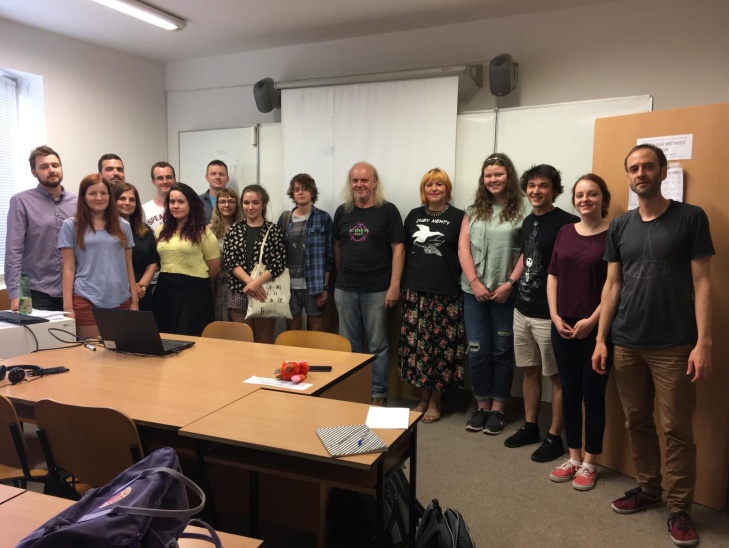Music of underprivileged groups: Roma and Jews
- Date: May 29 to June 2, 2017
- Creadits: 3
- Lecturers: prof. Zuzana Jurková, Charles University, Prague, and prof. Sarah Ross, and prof. Miranda Crowdus, both from the Hannover University of Music, Drama and Media.
One-week three-credit course organized in the framework of the Khamoro Romani Festival 2017 (May 29 – June 2, 2017), intended for university students.
Lectures by internationally recognized ethnomusicologists will be held in the mornings. During these lectures, students will acquire a basic overview of the regions where Roma people have contributed to the creation of distinctive musical cultures/musics. Lectures about Jewish music will give students a general overview of the Jewish musical traditions from around the globe. The second purpose of the course is to introduce the topics related to the study of music(s) of the underprivileged groups: questions of authorship attribution, negotiations between the musicians and audiences, stereotyping, musical representation, and cultural sensitivity.
In the afternoons, students will take part in workshops with Khamoro festival participants.
In the evenings, students will attend festival concerts.
Application form
(*Charles University students, and Erasmus students do not have to send an application—only register on SIS by March 5, 2017)
Sarah M. Ross is a professor of Jewish music studies and director of the European Center for Jewish Music at the Hannover University of Music, Drama, and Media in Germany. She obtained her Ph.D. in 2010 at the Rostock University of Music and Theatre in Germany. She is the author of A Season of Singing: Creating Feminist Jewish Music in the United States (Brandeis University Press, 2016), co-editor of Judaism and Emotion: Texts, Performance, Experience (Peter Lang, 2013) and editor of the book series Jewish Music Studies (Peter Lang). Her main fields of research are Jewish music, ethnomusicological gender studies, and music and sustainability.
Miranda Crowdus is a Research Associate at the European Center for Jewish Music at the Hannover University of Music, Drama and Media. The common thread driving her academic work in musicology and ethnomusicology is her engagement with Jewish identity and culture, inter-religious dialogue, and artistic expression. She completed her MPhil in 2011 at the University of Cambridge, and her PhD at City University London, where she focused on musical practices, Jewish identity, and cross-cultural encounters in the complex urban environment of South Tel Aviv, Israel.
See Zuzana Jurková’s biography here.
Music in Socialism and Postsocialism
- Date: June 19–27, 2017
- Credits: 4
- Lecturers: Prof. David Verbuč, with guests
The summer school Music in socialism and postsocialism will provide students with a general understanding of social, cultural, political, and economic conditions of the European socialist and postsocialist states, and the role of music in this regard. The class topics will be related to a variety of music cultures (art music, village music, folklore, rock, pop, and folk-pop) discussed in the context of culture and politics of socialism and/or postsocialism. Each class will be based on one or two case studies of particular music cultures form particular states. We will mostly focus on the case studies from Czechoslovakia and Yugoslavia (and their postsocialist counterparts), but will also consider other ones (e.g., Soviet Union, Poland, Hungary, Romania, and Bulgaria). The main framework of analysis will be the topics of resistance (via Alexei Yurchak), memory, and nationalism. We will host several local scholars, and will engage in conversations/interviews with local musicians and organizers who were part of the local music scenes during and/or after socialism. We will also watch relevant movies, visit local museums and institutions, and attend music concerts, related to the topic of the summer school. Students will be required to read several academic texts before and during the summer school, and respond to them in the form of short written assignments, as well as to write a short final paper (based on articles, and ethnographic work: interviews, concerts, etc).
Application form
(*Charles University students, and Erasmus students do not have to send an application—only register on SIS by March 5, 2017)
See David Verbuč's biography here.

Student participants of Music in socialism and postsocialism summer school, with guests Pavla Jonssonova from Dybbuk/Zuby Nechty, and Mira Wanek from Už jsme doma, FHS, June 27, 2017.
Musics in Israel
- Date: September 11–15, 2017
- Credits: 3
- Lecturer: prof. Essica Marks, Zefat Academic College, Israel
Israeli society, highly multicultural, consists of groups with different religious and cultural traditions. This multiculturalism is reflected in various musics of multiple styles and genres. The course “Musics in Israel” presents different musical cultures in Israel as part and consequence of historical and cultural processes.
The course will present the following topics:
1) Study of Jewish music as a cultural phenomenon. Examples of Ashkenazi and Sephardic music.
2) Music and national identity: Hebrew Israeli Folksongs
3) Global influences: Israeli Pop and Rock music
4) Music and social processes: Mediterranean music ("Muzika Mizrahit")
5) Music of the Arab minority in Israel.
Application form
(*Charles University students, and Erasmus students do not have to send an application—only register on SIS by March 5, 2017)
Dr. Essica Marks is a senior lecturer at the Zefat Academic College, Israel, and Head of the Literature, Art and Music department. She is employed as a fellow researcher at the Jewish Research Music Center based in the Hebrew University, Jerusalem. Her topics of research are: Ethnographic study, the liturgy of various Jewish traditions, history and theory of Arab music and Arab Music in Israel.